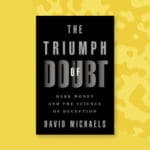David Michaels PhD, MPH is an epidemiologist and professor at the George Washington University School of Public Health. He has held high-level, Senate-confirmed public health positions in the administrations of President Barack Obama (in which he was Assistant Secretary of Labor for Occupational Safety and Health) and President Bill Clinton (Assistant Secretary of Energy for Environment, Safety and Health). Michaels is a leader in efforts to defend the integrity of the science underpinning public health and environmental protections, and is the author of “The Triumph of Doubt: Dark Money and the Science of Deception” (Oxford University Press, 2020) and “Doubt is Their Product” (Oxford University Press, 2008), as well as numerous articles in Science, JAMA, and other leading scientific publications.
A few words from David:
 “I was inspired to write this book by my experience running the Occupational Safety and Health Administration under President Obama. I witnessed and had to counter) efforts by polluters and manufacturers of hazardous products apply the “tobacco playbook” to delay public health protections and avoid compensating victims.”
“I was inspired to write this book by my experience running the Occupational Safety and Health Administration under President Obama. I witnessed and had to counter) efforts by polluters and manufacturers of hazardous products apply the “tobacco playbook” to delay public health protections and avoid compensating victims.”
Quote from The Triumph of Doubt:
“I describe this corporate strategy as “manufacturing doubt,” or “manufacturing uncertainty.” My objective is to identify, characterize, and illuminate this strategy so readers can see exactly what these mercenary scientists and the firms that hire them are doing. In just about every corner of the corporate world, conclusions that might support regulation are always disputed. Studies in animals will be deemed irrelevant, human data are dismissed as not representative, and exposure data are discredited as unreliable. Always, there’s too much doubt about the evidence, not enough proof of harm, not enough proof of enough harm. It is public relations disguised as science. The companies’ PR experts provide these scientists with contrarian sound bites that play well with reporters, who are mired in the trap of believing there must be two sides to every story equally worthy of fair-minded consideration. The scientists are deployed to influence regulatory agencies that might be trying to protect the public, or to defend against lawsuits by people who believe they were injured by the product in question. The corporations and their hired guns market their studies and reports as “sound science,” but actually they just sound like science. Such bought-and-paid for corporate research is sanctified, while any academic research that might threaten corporate interests is vilified. There’s a word for that: Orwellian. Individual companies and entire industries have been playing and fine-tuning this strategy for decades, disingenuously demanding proof over precaution in matters of public good. For industry, there is no better way to stymie government efforts to regulate a product that harms the public or the environment; debating the science is much easier and more effective than debating the policy. In earlier decades, we have seen this play out with tobacco, secondhand smoke, asbestos, industrial pollution, and a host of chemicals and products. These industries’ strategy of denial is alive and well today.”
Synopsis:
Powerful multinational corporations have long had a financial stake in undermining scientific consensus and manufacturing uncertainty. In The Triumph of Doubt, former Obama and Clinton official David Michaels details how corrupt science becomes public policy — and where it’s happening today.
Opioids. Concussions. Obesity. Climate change.
America is a country of everyday crises — big, long-spanning problems that persist, mostly unregulated, despite their toll on the country’s health and vitality. And for every case of government inaction on one of these issues, there is a set of familiar, doubtful refrains: The science is unclear. The data are inconclusive. Regulation is unjustified. It’s a slippery slope.
Is it?
The Triumph of Doubt traces the ascendance of science-for-hire in American life and government, from its origins in the tobacco industry in the 1950s to its current manifestations across government, public policy, and even professional sports. Well-heeled American corporations have long had a financial stake in undermining scientific consensus and manufacturing uncertainty; in “The Triumph of Doubt,” former Obama and Clinton official David Michaels details how bad science becomes public policy — and where it’s happening today.
Amid fraught conversations of “alternative facts” and “truth decay,” “The Triumph of Doubt” wields its unprecedented access to shine a light on the machinations and scope of manipulated science in American society. It is an urgent, revelatory work, one that promises to reorient conversations around science and the public good for the foreseeable future.
Related

January 2025
The January 2025 Bellagio Bulletin highlights stories from Warren Evans, Alice Hill, Karen Florini, Atsango Chesoni, Amitava Kumar, Vibha Galhotra and Elise Bernhardt, all engaged in work that deepens our relationships with the planet, society and one another.
More